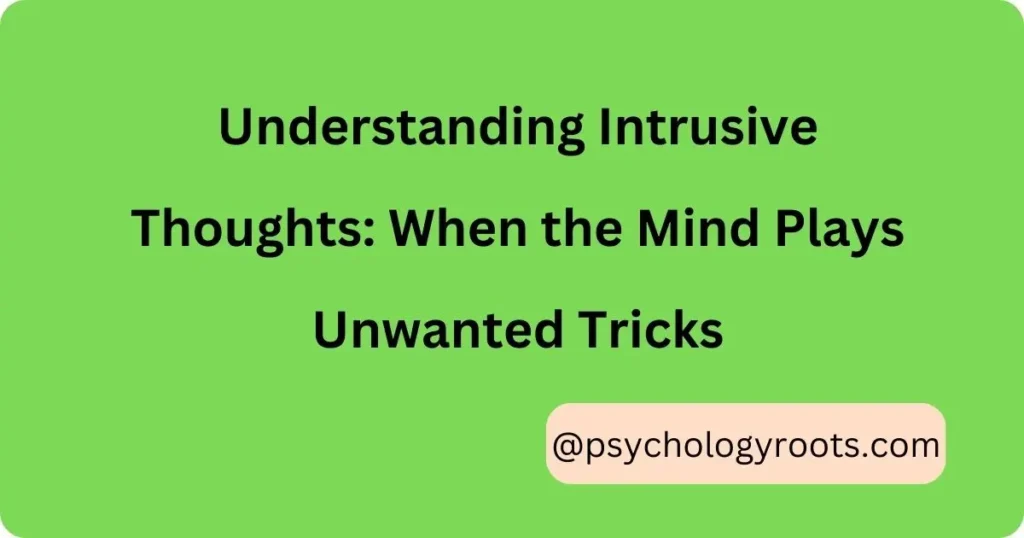Table of Contents
Understanding Intrusive Thoughts: When the Mind Plays Unwanted Tricks
Here in this post, we are discussing “Understanding Intrusive Thoughts: When the Mind Plays Unwanted Tricks”. You can read more about psychology-related material on our website. Keep visiting Psychology Roots.
Table of Contents
Intrusive thoughts are unwelcome and distressing mental experiences that can disrupt daily life and cause significant distress. They often appear abruptly, unexpectedly invading our minds with vivid and disturbing content. Understanding these intrusive thoughts is crucial in order to recognize them for what they are: a common occurrence that does not define our character or intentions.

The Nature of Intrusive Thoughts:
Intrusive thoughts are fleeting, involuntary, and often unsettling thoughts or images that emerge without conscious control. They can manifest in various forms, such as violent or aggressive scenarios, fears of contamination or harm, or even inappropriate sexual or blasphemous ideas. These thoughts are often accompanied by a strong emotional response, such as anxiety, guilt, or disgust, which further intensifies the distress.
Prevalence and Normalcy:
Contrary to popular belief, experiencing intrusive thoughts does not indicate mental illness or deviant behavior. Research suggests that up to 94% of the general population encounters intrusive thoughts at some point in their lives. They are a natural and common aspect of human cognition. It is the meaning and significance that we attach to these thoughts that determine their impact on our well-being.
Differentiating Intrusive Thoughts from Intentions:
One of the key aspects of intrusive thoughts is their stark contrast with our genuine desires and values. While the content of these thoughts may be alarming or disturbing, it is crucial to recognize that they do not reflect our true intentions or character. Individuals experiencing intrusive thoughts are often the least likely to act on them. Understanding this disconnect helps reduce the distress caused by these intrusive mental intrusions.
Relationship to Anxiety and Obsessive-Compulsive Disorder (OCD):
Intrusive thoughts are closely associated with anxiety disorders, particularly obsessive-compulsive disorder (OCD). People with OCD often experience intrusive thoughts that lead to distressing compulsions or rituals aimed at alleviating anxiety. Recognizing this link is essential in seeking appropriate help and support from mental health professionals who can provide effective interventions tailored to individual needs.
Managing Intrusive Thoughts:
Though intrusive thoughts can be distressing, there are strategies to help individuals manage them more effectively:
Mindfulness and Acceptance: By practicing mindfulness, individuals can learn to observe intrusive thoughts without judgment or attempting to suppress them. Accepting the presence of these thoughts, rather than engaging with them, can reduce their impact and minimize distress.
Cognitive Restructuring: This technique involves challenging the negative or catastrophic interpretations of intrusive thoughts. By reframing these thoughts in a more realistic and rational manner, individuals can gain a different perspective and decrease their distressing effects.
Seeking Professional Help: For individuals who find their intrusive thoughts significantly interfering with their daily functioning or causing excessive distress, it is essential to seek support from mental health professionals. Therapies such as cognitive-behavioral therapy (CBT) and medication management can offer effective strategies to cope with intrusive thoughts.
Conclusion:
Intrusive thoughts are a common and normal part of human experience. Understanding their nature, normalizing their occurrence, and distinguishing them from genuine intentions are crucial steps in managing their impact on our mental well-being. By employing various coping strategies and seeking professional help when needed, individuals can regain control over their thoughts and live fulfilling lives free from the burden of intrusive thoughts.
Help Us Improve This Article
Have you discovered an inaccuracy? We put out great effort to give accurate and scientifically trustworthy information to our readers. Please notify us if you discover any typographical or grammatical errors.
Make a comment. We acknowledge and appreciate your efforts.
If you have any scale or any material related to psychology kindly share it with us at psychologyroots@gmail.com. We help others on behalf of you.